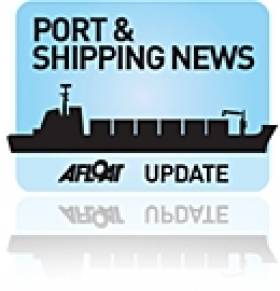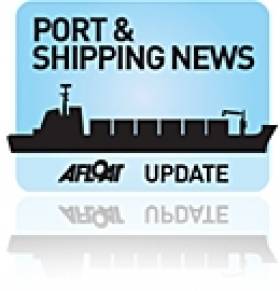Displaying items by tag: International Maritime Organisation
The International Maritime Organisation, the United Nations agency for the sea, has called for more involvement by women in the world’s maritime operations, marking today’s International Day for Women in the Maritime sphere.
Its Secretary-General, Arsenio Dominguez, says that, currently, only 29% of the overall maritime workforce and 20% of the workforce of national maritime authorities are women.
“Women make up less than 2% of seafarers worldwide. We must invest in women's education and professional development, empower women to drive innovation and foster sustainability within the maritime industry, to the benefit of all,” he said.
This year International Day for Women is on the role of women in maritime safety worldwide and highlighting the need to change attitudes towards gender in the maritime sector.
United Nations Dealing With Gender Imbalance In Maritime Sector
According to the United Nations’ International Maritime Organisation (IMO), women represent just 1.2% of the global seafarer workforce. So, at its Council meeting this week, it has announced that it will establish an ‘International Day for Women in Maritime.’
This will “celebrate women in the industry, promote the recruitment, retention and sustained employment of women in the maritime sector, raise the profile of women in maritime, strengthen IMO’s commitment to achieve gender equality and empower all women and girls) and support work to address the current gender imbalance in maritime,” the IMO said in a statement.
“It will also help will help promote IMO’s Women in Maritime Programme. Once adopted by the IMO Assembly in December, International Day for Women in Maritime is observed each year on May 18.”
Marine Notice on Changes to Lifeboat Release Mechanisms
#NEWS UPDATE - A recent Marine Notice from the Department of Transport, Tourism and Sport (DTTAS) advises on the adoption of new international resolutions pertaining to SOLAS regulations and changes to the International Life-Saving Appliance (LSA) Code.
The changes are intended to establish new stricter safety standards for lifeboat release and retrieval systems, aimed at preventing accidents during lifeboat launching, and will require the assessment and possible replacement of a large number of lifeboat release hooks.
Both of these changes are expected to come into force from 1 January 2013 with a view to full compliance by July 2019.
The Maritime Safety Committee of the International Maritime Organisation has also approved new guidelines for the evaulation and replaceent of lifeboat release systems, in which the DTTAS will require fall preventer devises, or FPDs, to be fitted.
Complete details for shipowners, ship operations, shipmasters and seafarers are included in Marine Notice No 54 of 2011, a PDF of which is available to read and download HERE.
UK Shipping Industry Rejects Emissions Trading Scheme
The UK's shipping industry has rejected the European Union's new emissions trading scheme, claiming it is unworkable in a global business.
The Guardian reports that campaigners have called for the inclusion of an emissions trading scheme as part of the EU's carbon reduction programme.
But Mike Brownrigg, director-general of the UK Chamber of Shipping, dismissed the idea as unworkable, claiming that ships would simply refuel at non-EU ports to avoid emissions quotas.
Brownrigg maintained that any solution must be "global - through the International Maritime Organisation - rather than regional".
He added that "we are just at the beginning of this discussion" - despite what The Guardian describes as "years of talks between shipping companies and governments over how to reduce emissions from the sector".
The Guardian has more on the story HERE.
Tanker Newbuilds for Cork-Based Global Operator
Ardmore Shipping Ltd manages the activities of the Ardmore Shipping Group, which is engaged in the ownership and operation of chemical and products tankers trading on a worldwide basis. The Irish registered company runs its global fiscal operations from the group's head-office based in Cork.
Like the existing fleet, the newbuilds are also to be registered in Majuro, the capital of the Marshall Islands, a republic nation in the Pacific Ocean. The Micronesian nation of atolls and islands attained independence 25 years ago under a Compact of Free Association with the United States.
Last month, two vessels entered service for the company, the Ardmore Centurion (2005 / 28,987 dwt) formerly the Elisa, is to date the company's only joint chemical and products tanker. The second December debutant was the slightly older, Ardmore Seatrader (2002 / 47,141 dwt) a products tanker, formerly the St. Georg. In fact both vessels were handed over within a 12-hour timeframe and on opposite sides of the world.
When the second newbuild is completed in 2013, this will bring to three the number of chemical and product tankers in service, with the Ardmore Centurion, which was also built in South Korea but at the STX Shipyard Jinhae. The Ardmore Seatrader, built by the Onomichi shipyard in Japan, now forms the third product-only tanker, out of the four-strong mixed vessel type fleet.
This leaves the two remaining product tankers, the Ardmore Seamaster (2004 / 45,840 dwt) which entered service in October. The vessel was the former Formosa 12 and was also built in Japan but at the Shin Kurushima shipyard. She will be employed under a long-term charter to D/S Norden of Copenhagen.
The last vessel of the Ardmore Shipping Group fleet, is the Ardmore Seafarer (2004 / 45,744 dwt) which entered service in July. The former Zoa Express, was completed at the Minami-Nippon Usuki shipyard in Japan. She was re-named in honour of the Ardmore's seafarers and in recognition of 2010 as the International Maritime Organisation (IMO) Year of the Seafarer.
Interestingly that in the Year of the Seafarer, in particular for the welfare of the crew of the Ardmore Seafarer, she came under the threat of pirates!... While on route from Dar Es Salaam to Fujairah the vessel was attacked by the pirates, 1,000 (nm) nautical miles off Somalia and some 500 nm off the coast of India. Thanks to quick and decisive actions, Captain Benamu and his crew evaded capture, ensuring that the pirates were unable to seize control of the 179m (length) X 32m (breadth) vessel. To see a photograph of this vessel click the link HERE































































